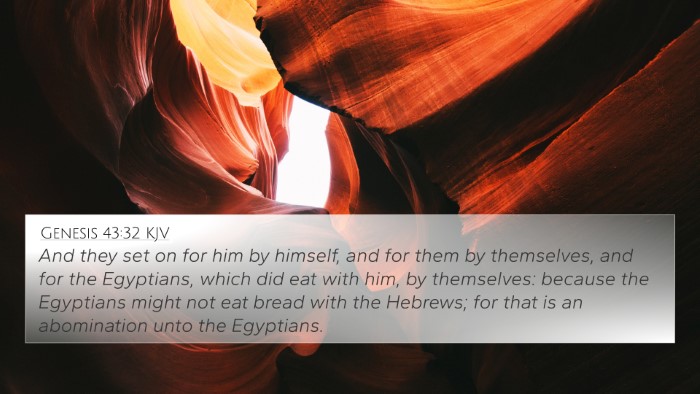Exploring Proverbs 23:1
Bible Verse: Proverbs 23:1
“When you sit down to eat with a ruler, consider diligently what is before you.”
Introduction to the Verse
This verse from Proverbs provides insight into the nature of social interactions, particularly in the presence of authority figures. It encourages awareness and mindfulness concerning both the physical and psychological implications of dining with someone of high status.
Summary of Biblical Commentary Insights
- Matthew Henry: Matthew Henry highlights the importance of prudence and discretion. He emphasizes that when one eats with a ruler, there should be careful consideration of their motives and the implications of accepting an invitation. This act is not just about sharing a meal; it carries cultural and relational weight.
- Albert Barnes: Barnes reflects on the need for practical wisdom in social engagements. He notes that associating with the powerful can lead to temptations or obligations that might compromise one's integrity. He advises weighing the benefits against potential pitfalls when dining with those in authority.
- Adam Clarke: Clarke considers the social customs surrounding meals with prominent individuals, suggesting that the act of eating together represents a form of fellowship or alliance. He points out that this sacred act should prompt self-examination and prudence concerning one's ambitions and desires.
Key Themes
This verse encapsulates several important themes:
- Awareness: Be conscious of your surroundings and the symbolism of sharing a meal with those in power.
- Consideration: Reflect on the intentions behind the invitation and the possible expectations attached to it.
- Wisdom: Exercise discernment in social situations that might have implications for one’s reputation or moral standing.
Connections to Other Bible Verses
Understanding Proverbs 23:1 involves cross-referencing various biblical texts to explore similar teachings and their implications.
- Proverbs 20:1: “Wine is a mocker, strong drink is raging: and whosoever is deceived thereby is not wise.” - This verse relates to the need for caution in indulgent situations.
- Proverbs 22:1: “A good name is rather to be chosen than great riches.” - This emphasizes the importance of reputation when interacting with influential individuals.
- Ecclesiastes 10:2: “A wise man's heart is at his right hand; but a fool's heart at his left.” - This speaks to the wisdom needed in social dealings.
- James 4:10: “Humble yourselves in the sight of the Lord, and he shall lift you up.” - A reminder of the humility necessary when interacting with authorities.
- Luke 14:8-11: The parable of the wedding feast illustrates the wisdom of understanding one’s place in social hierarchies.
- Philippians 4:5: “Let your moderation be known unto all men. The Lord is at hand.” - Encourages balanced conduct around influential figures.
- Romans 12:3: “For I say, through the grace given unto me, to every man that is among you, not to think of himself more highly than he ought to think.” - Reflects on self-awareness in the face of authority.
The Importance of Cross-Referencing in Biblical Study
Cross-referencing verses enriches the understanding of Biblical themes. Tools for Bible cross-referencing, such as a Bible concordance, help uncover the intricate links between scriptures, providing deeper insights into their meanings.
Effective Methods for Cross-Referencing
- Utilizing a Bible cross-reference guide to identify related scriptures.
- Engaging in cross-reference Bible study to explore thematic connections.
- Employing a Bible reference resource to map out where similar ideas are presented throughout the text.
Thematic Bible Verse Connections
Thematic connections between Bible verses can provide a comprehensive view of scripture narratives and teachings. Cross-referenced themes contribute to understanding the moral and ethical implications of various situations, such as those presented in Proverbs 23:1.
Conclusion
The wisdom found in Proverbs 23:1 serves as a timeless reminder of the need for awareness and discretion in social interactions, especially with those in authority. By engaging in comparative Bible verse analysis, one can grasp the multifaceted lessons provided by scripture, enhancing both personal understanding and spiritual growth.




